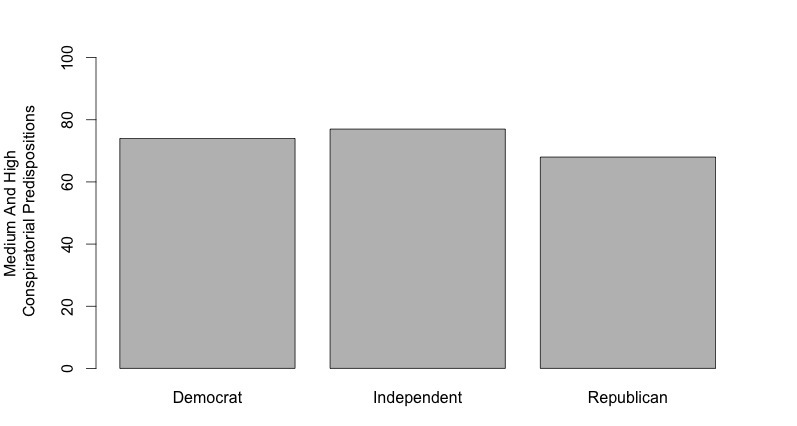In the Washington Post, Alfred Moore, Joseph Parent and Joseph Uscinski show that it’s not just fringe activists on either side of the divide that indulge in conspiracy theorizing: it really is just as common on the left as it is on the right.
Krugman makes a fair point: in moderation conspiracy theories may show healthy skepticism, but in excess they can erode the trust needed for states to fulfill their basic functions and warp the respect for evidence necessary for sound decision making.
Yet Krugman is mostly wrong that nuttiness is found mainly among conservatives, and his misperception actually reveals a great deal about U.S. politics. People of all political persuasions believe their views are objectively right and others hold positions that are arbitrary and asinine. Daniel Kahan finds that partisan commitments make people look for evidence to justify their conclusions. Even when, say, liberals come up with a correct answer, it may not have been because of their high esteem for evidence. They just got lucky. The implication is that people use data like drunks use lampposts: more for support than illumination. Columnist Ezra Klein concurs with Kahan, although he points out the large numbers of Republicans who refuse to accept climate science and wonders whether there is a liberal equivalent to climate change denial.
[…]
In our survey, we also measured respondents’ underlying propensity to believe in conspiracy theories — that is, the general mindset that leads people to accept or reject conspiracy theories. We asked respondents whether they agreed with four statements:
- “Much of our lives are being controlled by plots hatched in secret places,”
- “Even though we live in a democracy, a few people will always run things anyway,”
- “The people who really ‘run’ the country are not known to the voters.”
- “Big events like wars, the current recession, and the outcomes of elections are controlled by small groups of people who are working in secret against the rest of us.”
We combined these questions into one summary measure. This graph shows the percentage of Democrats, Republicans, and independents that showed a strong or medium disposition towards thinking conspiratorially.
The upshot: near symmetry between left and right.If Republicans and Democrats are equally prone to believing in conspiracy theories, where then is the liberal equivalent of climate change denial? An obvious possibility is the belief that Big Oil conspires to marginalize unfavorable findings or block alternative energies. Our survey, for example, shows that 52 percent of Democrats believe corporations are conspiring against us.




